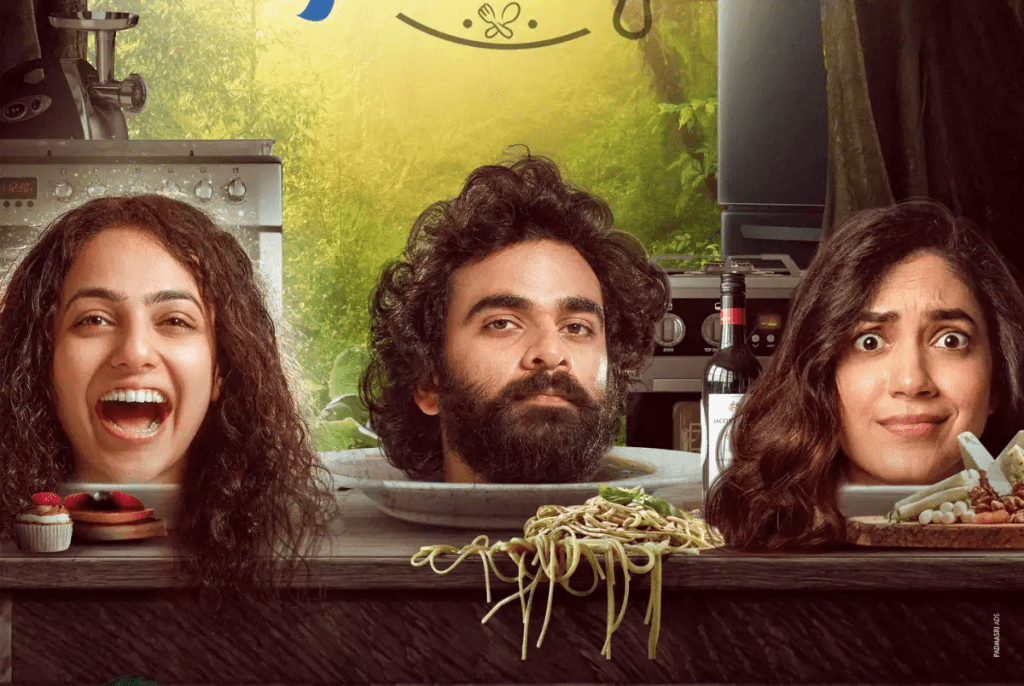
Story:
Dev is a new chef recruit in a restaurant located in a sleepy suburb in London. His frequent muscle spasms become a cause for unintentional humour in the kitchen, particularly annoying his colleague Tara, a senior to him by a month. Dev and Tara are unexpectedly locked in the restaurant for a night, where they discover each other’s lives over food and never-ending midnight conversations. What was Dev’s life a few years ago? Is there a deeper reason behind Tara’s role at the restaurant?
Analysis:
‘Wake up early to watch the sunrise, laugh till your stomach hurts, cook and eat to your heart’s content, don’t care two hoots about what the world says and lead a happy life,’ a childhood sweetheart casually tells Dev over a bike ride. As dreamy and innocent as it sounds, the words precisely summarise what first-time filmmaker Ani Sasi, (son of Malayalam filmmaker I V Sasi and a former protégé of Priyadarshan) strives to convey through Ninnila Ninnila.
The director displays terrific command over his craft in this rom-com about sweet-little nothings – losing yourself in the aroma of a dish or celebrating Christmas in a snow-covered city or a midnight conversation. Ninnila Ninnila has a surreal visual ambience – the mood is so casual, light-hearted and yet profound. The storyline is wafer-thin but this is a film you need to watch for its free-flowing moments.
Food is the medium through which its pivotal characters reflect upon their past and present – there’s a distinct aroma to the leisurely treatment. Ani Sasi delves into the emotion beneath making food for your beloved and how it’s a doorway to reach their soul. From the black pepper soup to the gold crusted fish to the samosas, the filmmaker unravels many chapters in the life of its protagonists through food.
The dialogue is minimal and there’s enough space to soak in this dreamy setting. Even the so-called dark situations are wrapped up in a flash – the breeziness in the storytelling is sustained till the very last frame. The film comes into its own in the portions where Dev and Tara are accidentally locked up in their restaurant over a night. There’s a dreamy vibe in the air as the two find comfort in each other’s company, discovering their quirks and eccentricities.
The flashbacks are compact (partly reminding you of Pelli Choopulu), though you wonder why Dev’s childhood friend Maya has to act like a retard at times – she’s very close to being the ‘staple bubbly girl’ of Telugu cinema (but there’s more to her beyond the vivaciousness here). Otherwise, everything about the film remains understated and measured (an unlikely entrant in Telugu cinema, but we’ll take it). Here’s the work of a first-time filmmaker whose creative vision is uncorrupted and brimming with innocence. Ninnila Ninnila is like waking up to a warm cup of coffee on a misty morning amidst a scenic island.
Performances:

Ashok Selvan’s Telugu isn’t always perfect, although he’s a good fit to play the vulnerable, good-hearted youngster with a passion for food. He has a charming screen-presence, sports a radiant smile and places good emphasis on body language. Ritu Varma is a delight to watch, both in terms of her appearance and the poignant performance. She has evolved over the years and now makes acting look like a walk in the park.
Nithya Menen’s choices lately have always been braver and more interesting – this is a role where she could have easily gone over-the-top and even got away with it. She has that stroke of magic and nails that thin line separating exaggeration from child-like enthusiasm. Nasser’s experience brings the perfect balance and depth to a film boasting of many new-age talents. Sandhya Janak, Kedar Shankar and Sathya ably support the performances of the lead cast.
Music and other departments:
Rajesh Murugan’s breezy music works better within the scope of the film but doesn’t register the same impact as a standalone album. The background score provides a perfect foil for Ani Sasi’s surreal universe. Cinematographer Divakar Mani understands and complements the temperament and the mood of the film, not letting the pomp of London dominate the proceedings. The dialogues are thankfully conversational – no sermons delivered and the writer of this review says it with an element of relief.
Highlights:
- Good performances
- Technically brilliant
- Subtle treatment, good filmmaking
Drawbacks:
- Absence of a concrete storyline
- Sluggish start
Rating: 3/5
Review by Srivathsan Nadadhur